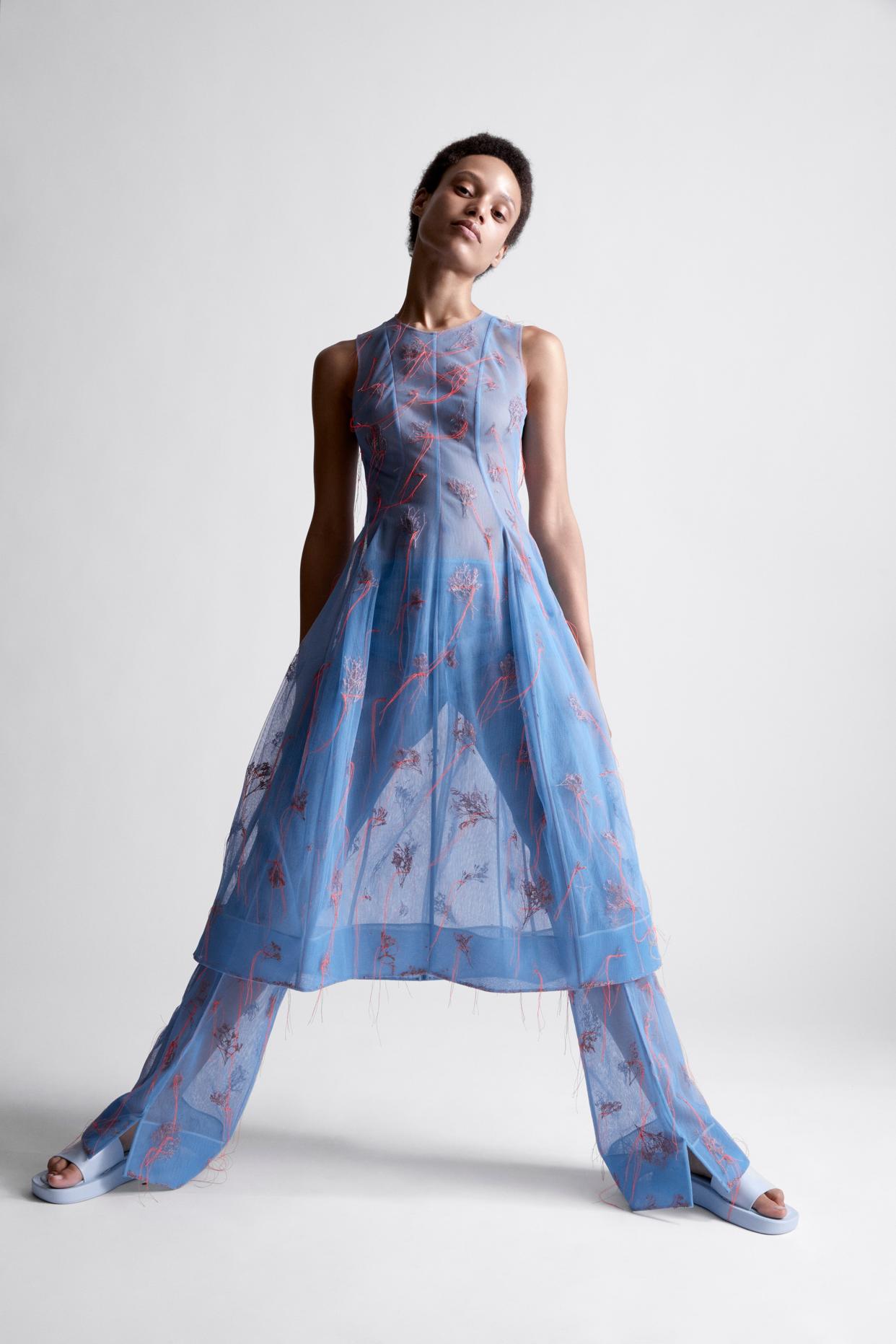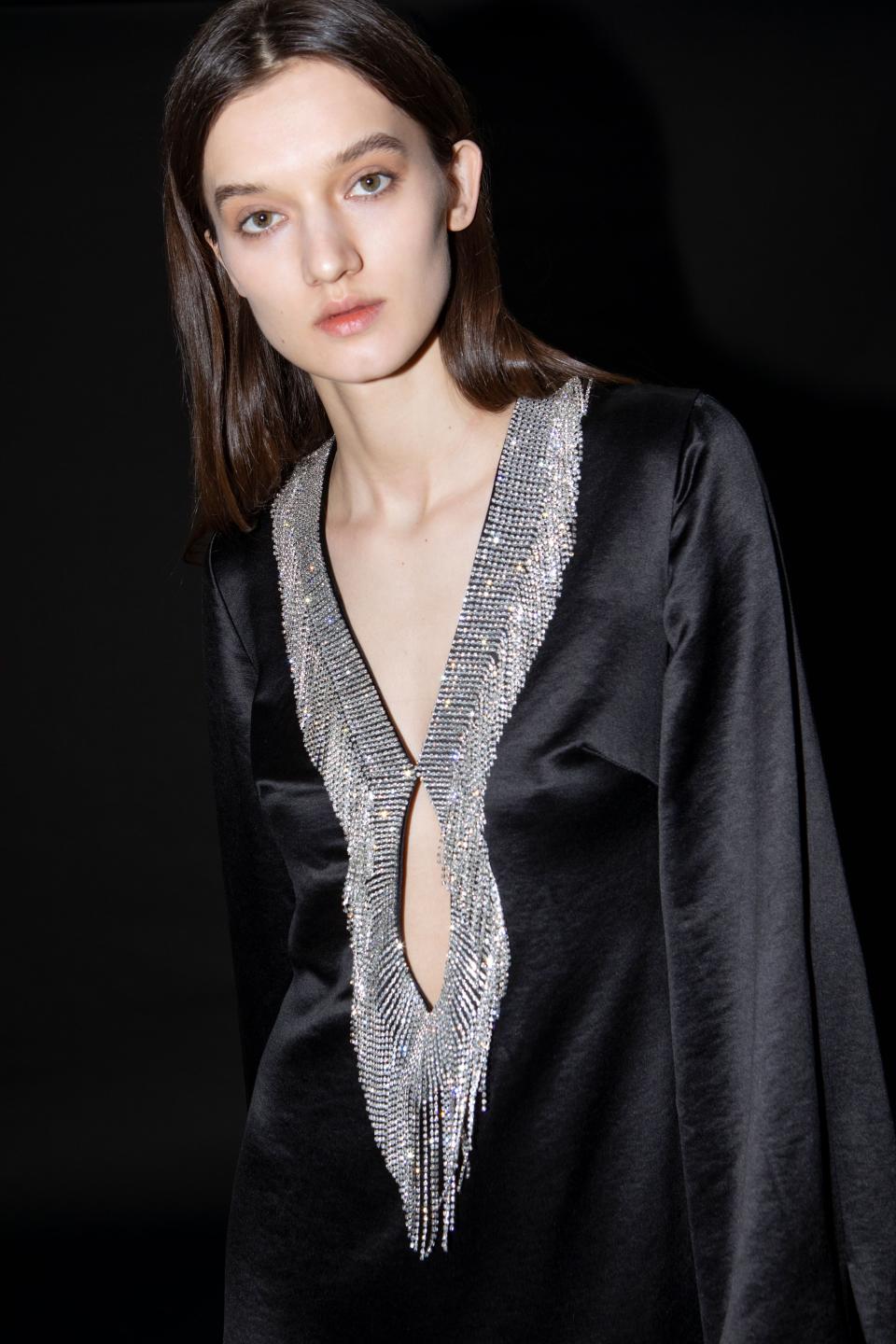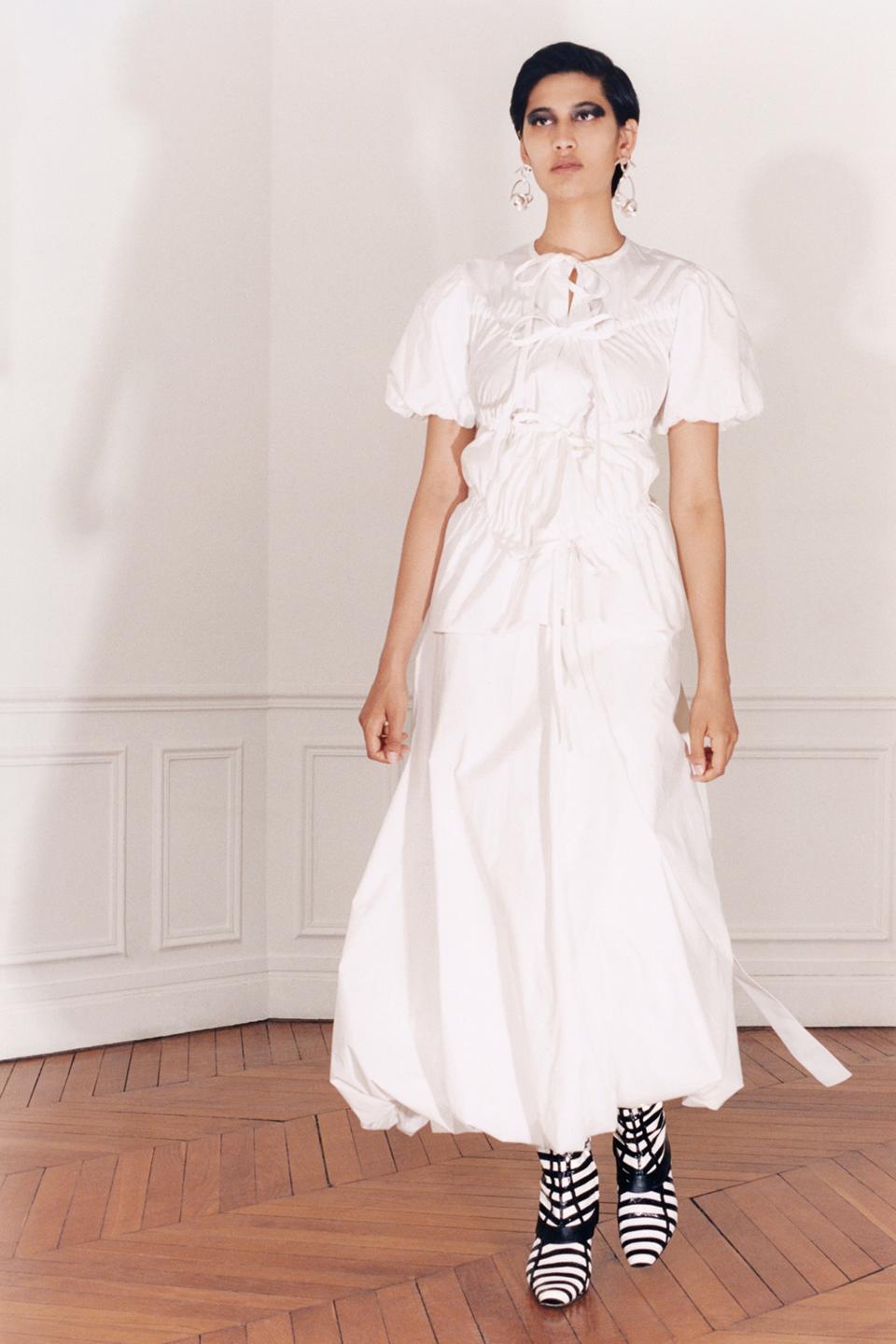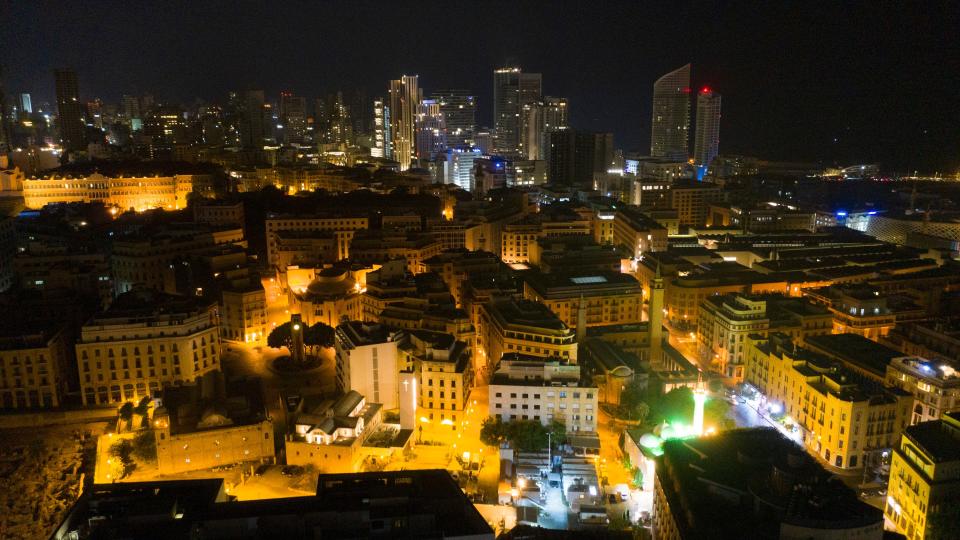A Year After the Beirut Explosion, Lebanon Is Still Suffering—Here, 3 Designers Share Their Stories

- Oops!Something went wrong.Please try again later.
- Oops!Something went wrong.Please try again later.


Today marks a year since the devastating explosion in the port of Beirut on August 4th, 2020. The blast, which has been mostly attributed to government negligence, killed more than 200 people and injured thousands. A stalled investigation has yet to determine why exactly 2,750 tons of ammonium nitrate ignited—and why they were improperly stored at the port in the first place.
Much of the damage occurred in the Gemmayzeh neighborhood, the city’s hub for fashion and art. “I am still not able to process the devastation that occurred, especially to the Lebanese creative community,” Renaissance Renaissance designer Cynthia Merhej told Vogue days later. “Some of the hardest hit areas are where the majority of everyone I know lives, works, and hangs out.”
A year later, most of those places remain damaged or simply deserted. With little in the way of government assistance, rebuilding is mostly left to individuals, a reality at odds with Lebanon’s economic collapse. Due to hyperinflation, rising unemployment, and zero social safety net, the United Nations estimates that 77% of Lebanese households don’t have enough money for food. “Everyone who had the opportunity to leave did,” Rabih Kayrouz said on a call from France. Merhej and Sandra Mansour rattled off a list of places their friends have departed to: Cairo, Dubai, Paris, Qatar, London. “Young people don’t want to stay, because they see no future here,” Merhej says. “The explosion ripped apart the fabric of our creative society.”
And yet—Kayrouz, Merhej, and Mansour are committed to keeping parts of their brands firmly rooted in Lebanon. Kayrouz’s production team is in Beirut; Mansour’s atelier and showroom are there; and Merhej’s mother and patternmaker are in a nearby suburb. “I can’t just close the business and turn my back on my team,” Kayrouz says. “I have 15 families [of artisans] to protect. If they’re not working, they don’t have any support. It’s not like in Europe or another country, where you have retirement plans or some [insurance]. I have to protect these people. I made it so those 15 families can stay employed, and we’re also here for our clients, who will want happy clothes someday.”
“For me, it was important to stay in Lebanon and keep giving my team work, and to keep working with my suppliers and my artisans,” Mansour adds. “I have to keep this ecosystem alive. But you can’t judge anyone [for leaving]… I think it’s a personal choice, but I really do hope for a better tomorrow in Lebanon.”
Here, Kayrouz, Merhej, and Mansour share more of their experiences from the past year.
Rabih Kayrouz, founder of Maison Rabih Kayrouz
“Even though I’m not physically harmed, and I’m trying to reconstruct my business and be helpful to my community, my city is not healed. This is what is blocking the healing process [for all of us]. How can you rebuild a city when you still don’t know what happened?
It is quite difficult to just go on and continue, but I did. I’m working to cope and maintain a business. I can’t just close the business and turn my back on my team, but I couldn’t be in Lebanon this month [for the anniversary]. It was too much for me. I wanted to get away, but even if I’m far, my heart is there. My family is there.
I can recall the moment I was talking to Sarah Mower last year, when I was at the hospital after the blast. And I feel like I’m having the same conversation today, using almost the same words. My head is okay, thank God—I don’t have any pain or problems. But my heart is broken, because everyone is trying to heal and rebuild, and we are extremely positive people. The Lebanese are entrepreneurs, creatives, people who love life. We are doers. But I’m realizing now, one year later, that nothing has changed. We don’t have 24 hour electricity [due to the financial crisis], we don’t have fuel to drive our cars.
Before the 4th of August, I was saying we need to [support] Lebanese fashion production, so that Lebanese designers can produce here and create job opportunities and build factories instead of going to Turkey or Syria or Europe. I said, why can’t we produce in Lebanon with the same quality as Europe? I was ready to launch a whole program to do this, and then the blast happened. I know all of these designers who would love to stay in Lebanon, but now we’re just fighting to survive.
My brand is based in Paris, so of course I came to Paris. But I decided after the blast to make my collection only in Lebanon, produced in Lebanon with my team. I have 15 families [of artisans] to protect. If they’re not working, they don’t have any support. It’s not like in Europe or another country, where you have retirement plans or some [insurance]. I have to protect these people.
My work is my way to live. I love my work, and part of my healing was my work. The process that I went through, it wasn’t just the explosion, but everything that happened in the world last year—all of this made me think differently about my work and how I see it. I love clothes, and I’m not interested in these quick trends that [fade] in six months. I’ve always loved clothes, and I love women. So I just wanted to do a wardrobe [for fall 2021 couture] and re-concentrate on what I love.”

Beirut's Crisis-Induced Electricity Shortages Affect Country's Vital Sectors
Cynthia Merhej, founder of Renaissance Renaissance
“Prior to the explosion, Lebanon was undergoing a severe economic crisis. The World Bank is calling it one of the worst in history. So we were already suffering quite a bit. And then we had COVID, and the explosion… I think for a lot of people, the explosion really just destroyed whatever hope they had.
We have zero government here, it’s complete anarchy. After the blast, I went down and was cleaning glass and debris from the streets—me and thousands of people. Imagine your building explodes, and no one comes to help. You just have to grab a broom. Nothing is being rebuilt, because we’re the people who built it all—there’s no government assistance. All the places we used to go to see people are gone, like Papercup, the coffee shop and bookstore where my sister worked. She was someone who really loved Beirut and really wanted to stay, and in an instant, she lost everything—her job, her house, her car.
After the blast, I started a GoFundMe for three other creative businesses, and the support was really incredible. But now, one year on, I think a lot of people are realizing it’s still really difficult to live here, because beyond the fact that the general infrastructure was destroyed, we’re still suffering a horrible financial collapse. There are no basic things—no electricity, no internet, no gas for cars. The currency fluctuates every day, so it’s impossible to price anything… And with COVID, we haven’t had people visiting, so the market has dried up.
A lot of people have just moved elsewhere—basically whoever is able to leave has left. I’ve been gone for a year—I went to Paris three weeks after the explosion—and now when I’m back, I keep discovering more and more people who left. The blast ripped apart the whole fabric of our creative society. Everyone went in different directions, and now we’re just trying to locate each other.
I was planning to leave anyway, even before the explosion, because the financial crisis destroyed any chance of having a business here or a future. I had to uproot myself so quickly, and figure out where I was going to live, and do the immigration paperwork… That’s daunting enough, but at the same time, the fashion system continues. You can’t just stop. So trying to maintain the business on the fashion cycle… It was a huge challenge. But I’m really proud that we pulled it off. I’m so grateful to my mom, who was working with me long-distance from Lebanon [while I was in Paris], and our seamstress and my good friend who helped us with the patterns.
My atelier is still in Beirut, where I do all my creative development, and now I’m producing everything in Italy, which has been incredible. It’s been a good end to a horrible year. I feel really lucky to have supportive people around me, my friends and family, my husband—they helped me get through everything. I can finally say, okay: A year later, I feel fresh again.”
Sandra Mansour
“We decided to close our office for the 4th of August this year as a sign of respect. It’s going to be a national day of remembrance. People are feeling a bit sad, because we’re all apprehending the anniversary, but my team and I are going to wear white because we still hope for a better tomorrow.
So many people lost a loved one, and I have friends who are still recovering from injuries from the explosion. But I was very lucky, because it was only material goods that I lost [in the blast]. Afterwards, I heard from so many NGOs who came to assess the damages in my atelier and help me fix it, but [ultimately] we had to leave the building.
We relocated our offices further from the city center and got a bigger space. But it was really complicated, because we had to work in a completely destroyed showroom for three months while the new atelier was cleaned and painted and finished. We had to keep working because we had orders we had to fill and our summer collection to finish. It was quite hectic—I think we moved five times. I think it took until February until we were fully operational, because in January we had another lockdown [for COVID-19]. Then we were back on our feet.
I have a lot of friends who moved their entire businesses to other Arab countries, or to Europe, or Qatar, but for me it was important to stay in Lebanon and keep giving my team work, and to keep working with my suppliers and my artisans… It’s my duty to give them work, because I don’t want the whole infrastructure to collapse. I have to keep this ecosystem alive. But you can’t judge anyone [for leaving], because some people have been more traumatized by this. I think it’s a personal choice, but I really do hope for a better tomorrow in Lebanon.
Creating has definitely been a little hard, but I think we all need to escape, and for me creating has always been my escape. It feels like I can breathe, and can forget everything that is happening in Lebanon. This season, I’m really into strong colors—I feel I need color and a bit of light. I’m using colors a bit like healing stones, like a purple that’s similar to an amethyst. It’s healing for me. And I always say to myself, I’m so lucky to work in such a beautiful field. I mean, there are worse jobs. So I try to always see the positive in everything I do.”
Originally Appeared on Vogue

